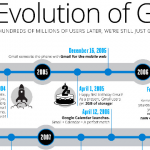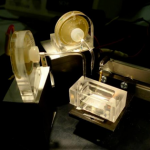Hydrogel Process Creates Transparent Brain For Research
First time accepted submitter jds91md writes "Scientists at Stanford have developed a technique to see the structural detail of actual brains with resolution down to the cellular and axonal/dendritic level. The process called CLARITY allows a 'transparent' view of the brain without having to slice or section it in any way. From the article: 'Even more important, experts say, is that unlike earlier methods for making the tissue of brains and other organs transparent, the new process, called Clarity by its inventors, preserves the biochemistry of the brain so well that researchers can test it over and over again with chemicals that highlight specific structures within a brain and provide clues to its past activity. The researchers say this process may help uncover the physical underpinnings of devastating mental disorders like schizophrenia, autism, post-traumatic stress disorder and others.'" Read more of this story at Slashdot.
Scifi Remodel: People Who Have Converted Their Homes into Imaginary Worlds
As they sing in the Rocky Horror Picture Show , "Don't dream it — be it." That's what these fans have done, by turing rooms and even whole apartments into the sets from their favorite science fiction shows and movies. Read more...
BitCoin Value Collapses, Possibly Due To DDoS
hydrofix writes "The Bitcoin-to-USD exchange rate had been climbing steadily since January 2013, from around 30 USD to over 250 USD only 24 hours ago. Now, the value bubble seems to have burst, at least partially. The primary trading site MtGox reported a drop in value all the way down to 140 USD today, a loss of almost half in real value. With many sites unreachable or slow, there are also news of a possible DDoS attack on MtGox: 'Attackers wait until the price of Bitcoins reaches a certain value, sell, destabilize the exchange, wait for everybody to panic-sell their Bitcoins, wait for the price to drop to a certain amount, then stop the attack and start buying as much as they can. Repeat this two or three times like we saw over the past few days and they profit.'" Read more of this story at Slashdot.
The Evolution of Gmail, Visualized
On April Fools Day 2004, Google launched Gmail, and it wasn't long before @gmail.com email addresses usurped the kingdom of Hotmail. Google just posted a nice visualization of the service's evolution from a humble beta to a Google Goliath. More »
Apple said to be ditching Samsung in favor of TSMC for A7 CPU
The fact that Apple relies upon Samsung, its arch-rival , for a healthy amount of its components, is one of the biggest paradoxes in the tech industry. Still, if The Korea Times is to be believed, the unhappy marriage between the two could rapidly be heading towards a divorce. While Apple has previously splashed out several billion per year on Samsung components, the newspaper is suggesting that Cupertino will turn to TSMC to produce its next generation of mobile CPUs -- a rumor that's been making the rounds recently. It's source, and executive at one of Samsung's partners, claims the manufacturer has been cut out of development of the A7 CPU, adding a little bit more credence to those claims. What's more, the same source reports that TSMC is gearing up its 20-nanometer production line to crank out the hardware ready for 2014. Comments Via: The Next Web Source: Korea Times
IRS Can Read Your Email Without Warrant
kodiaktau writes "The ACLU has issued a FOIA request to determine whether the IRS gets warrants before reading taxpayers' email. The request is based on the antiquated Electronic Communication Protection Act — federal agencies can and do request and read email that is over 180 days old. The IRS response can be found at the ACLU's website. The IRS asserts that it can and will continue to make warrantless requests to ISPs to track down tax evasion. Quoting: 'The documents the ACLU obtained make clear that, before Warshak, it was the policy of the IRS to read people’s email without getting a warrant. Not only that, but the IRS believed that the Fourth Amendment did not apply to email at all. A 2009 "Search Warrant Handbook" from the IRS Criminal Tax Division’s Office of Chief Counsel baldly asserts that "the Fourth Amendment does not protect communications held in electronic storage, such as email messages stored on a server, because internet users do not have a reasonable expectation of privacy in such communications." Again in 2010, a presentation by the IRS Office of Chief Counsel asserts that the "4th Amendment Does Not Protect Emails Stored on Server" and there is "No Privacy Expectation" in those emails.'" Read more of this story at Slashdot.
Teehan+Lax releases easy-to-use hyperlapse tool, blows everyone’s goddamn mind
Have you ever been clicking along a particularly stunning stretch of road in Google Street View and thought: damn, how awesome it would be if you could stitch all these individual images together and turn them into a video? Well... sit down. Clear your schedule. There's something you need to see. Read more...
3D printed synthetic tissue folds itself into shapes
University of Oxford chemists custom-built a 3D printer that fabricates "synthetic tissue," or rather structures with tissue-like functions. Eventually, the technology could be used to crank out replacement tissue that could replace damaged human tissue or be used in new drug delivery systems. The material consist of a network of water droplets encapsulated in lipids, or fat molecules. "The droplets… form pathways through the network that mimic nerves and are able to transmit electrical signals from one side of a network to the other," says Oxford University chemistry professor Hagan Bayley. Amazingly, the material can be chemically "programmed" to fold into various shapes as water is transferred around in the network. (Video above.) " 3D printer can build synthetic tissues " (Univ of Oxford, via Science News ) " A Tissue-like Printed Material " (Science)
GE Is Freeing Up ‘Thousands’ Patents to Fuel Your Imagination
Today, at an event in New York, GE announced that it will open up "thousands" of patents from its library of some 20,000 to inventors using Quirky's crowdsourced product development platform. That means that if you're bright enough, you can use a GE patent to invent something. GE will still collect royalties on your brain power, but they promise not to sue you. More »
S. Korea Says Cyber Attack From North Wiped 48,700 Machines
wiredmikey writes "An official investigation into a major cyber attack on South Korean banks and broadcasters last month has determined that North Korea's military intelligence agency was responsible. An investigation into access records and the malware used in the attack pointed to the North's military Reconnaissance General Bureau as the source, the Korea Internet and Security Agency (KISA) said on Wednesday. To spread the malware, the attackers went through 49 different places in 10 countries including South Korea, the investigation found. The attacks used malware that can wipe the contents of a computer's hard disk (including Linux machines) and damaged 48,700 machines including PCs, ATMs, and servers." Read more of this story at Slashdot.











